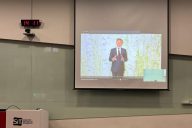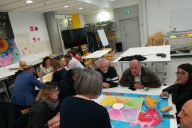Current and future challenges of societies need multi- and interdisciplinary, but also interprofessional approaches for us to adapt to and solve unpredictable situations and problems. The support needs of clients in social and health services can be very diverse. Thus, currently also social and health care legislation in Finland requires professionals to cooperate in a multidisciplinary manner whenever necessary. Therefore, working in social and health care services requires not only professional competences but also transversal skills.
According to World Health Organization (2010, p.7), interprofessional work is defined as follows: “When two or more health professions learn about, from, and with each other to foster effective collaboration and improve the outcomes and quality of care”. Interprofessional work is positively associated with job satisfaction, autonomy and engagement (2). Additionally, interprofessional work is needed to alleviate employees’ workload and prevent burnout (3). At best, the power of interprofessional work is that each professional can offer help and support to each other. In other words, interprofessional work is beneficial for clients, but also for employees. However, even if every professional has their own specific core skills and demands, transversal skills are needed. Transversal skills are also often called ‘soft skills’, ‘key skills’, ‘core skills’ or ‘transferable skills’ (Gogging et al. 2019) and ‘generic skills’ (5, 6).
Educating interprofessional work professionals and transversal skills
While educating students, in interprofessional education practice, students of different health professions learn ‘from, with and about each other’(7). During the educational process, interprofessional relationships between identity, knowledge, and professional power can be explored together (8). There are demands for all professions for collaboration because interprofessional work professionals need each other to achieve the best solutions and results for clients (see for example Social Welfare Act 2014).
The best results can only be achieved with professionals’ strong collaboration skills and open-minded attitudes. Furthermore, education in social and health care rarely provides opportunities for practicing and developing interprofessional collaboration skills before students’ transition to working life, and it mostly focuses on technical and substantive aspects of work (Saarinen 2020). Therefore, general skills, like transversal skills, are important.
Transversal skills are one suggestion to;
- build a bridge between social and health care professionals and
- support flexible collaboration between different professions.
For example, OECD has pointed out that social and emotional skills (empathy, respect, self-efficacy, responsibility and collaboration) are becoming essential at workplaces (OECD Future of Education and Skills 2030).
Transversal skills in higher education
In many EU countries, national education policies have highlighted the relationship between education and work, and the importance of students’ generic competencies connected to them. For example, social and emotional skills have been rising in importance in education policy and in the public debate (OECD). Transversal skills can be seen as part of the idea of lifelong learning, “all learning activity undertaken throughout life, with the aim of improving knowledge, skills and competences within a personal, civic, social and/or employment-related perspective” (European Commission 2001, 9). They are not just the ‘best image of flexible employability in the labor market’ (6), but also transferable skills to improve personal flexibility and to increase possibilities on unpredictable labor markets.
Transversal skills are quite a new phenomenon in the higher education context. There has been more discussion of generic skills in primary and secondary schools. Now, Metropolia has launched an ITSHEC (Integration of transversal skills into healthcare and social care higher education and curriculum) project concentrating on three transversal skills:
- a) Critical and Creative Thinking
- b) Interpersonal and Socioemotional Skills
- c) Learning to Learn
Our definitions and limitations are based on project applications.
In the project, we have had a preliminary data collection of participants’, university students, experiences of learning transversal skills in their studies. The data was collected in spring 2021. Students from Finland, Spain and Croatia took part in the focus group interview. Collected and analyzed data will be used to produce a Methodological Guide, an outcome of the project to be released in January 2022. In this article we present some results derived from the results of the interviews in Metropolia. According to the data, Master students (10) listed different examples of situations in their study field where they need to take transversal skills into account. In this text, we present two questions and their results. One of the questions was “In which situations do you believe that transversal skills are important?”
Students’ experiences of transversal skills
According to the students’ answers, transversal skills are touched upon in all work-life encounters, in service user interface situations, in all decisions where different situations are evaluated and in working community interactions, where one has to regulate oneself or control someone else’s emotional regulation. All of these can thus be combined with working life interactions, development and self-development.
“Need to think how to act as a supervisor if you are critical of something in your work with service users: can I completely disagree with the service users? How do I feel about it and how do I take the matter forward, even if I disagree with them?”
“Interaction and emotional skills and social influence are emphasized in working life and client work.”
Some pedagogical tips for teaching and learning transversal skills
The second question was focused on teaching and learning strategies. The question was, “What do you think are the most useful strategies for developing the following skills: critical and creative thinking, interpersonal/socio-emotional and citizen-oriented skills and learning to learn?”
As a result of the interviews, students pointed out that studying in groups and discussions together are useful strategies for developing both critical and creative thinking and interpersonal/socio-emotional skills. Teacher supervising the discussion and reflecting with students was felt very important and relevant pedagogical way to improve transversal skills, especially while developing critical and creative thinking.
”Self-assessment and peer review after collaborative learning is a useful strategy for developing transversal skills.” (One student in the group interview)
According to one student, a useful strategy for developing creative thinking is that student has to use some new method in solving a given problem. Students listed different kind of teaching and learning strategies to develop transversal skills, such as:
- Group discussions, collaborative learning
- Oral exams in groups and informal discussions with other students
- Self-assessment and peer review of students’ papers
- Essays: a student has to use source literature as well as reflect one’s own experiences in the field
- Group discussions based on work experience/internships of students
- Creating safe learning environment to practice transversal skills
- Case work
- Using virtual reality, case simulation
To sum up, there are many different possibilities to teach transversal skills. Still, the intended learning outcomes and pedagogical approach in teaching specify and define teaching and learning strategies. After all, reflection is a key for deeper learning outcomes, regardless of learning content.
Conclusion
Transversal skills and competences are recognized in general in upper secondary schools (Finnish National Agency for Education), but not so much yet in higher education. According to Finnish National Agency for Education (2021), they are an interpretation of values, attitudes, skills and will. They are formulated into the core curriculum. In higher education, these competences are missing even though, for example, the social services curriculum is based on national (ARENE, the Rectors’ Conference of Finnish Universities of Applied Sciences) and international (EQF, European Qualifications Framework) competences.
There has not been much attention to transversal competences. However, a complex world with unpredictable challenges and regulation concerning multidisciplinary between different fields require flexible professionals who can work in changing interdisciplinary and interprofessional groups. In other words, we need to pay more attention to higher education students’ transversal skills and to develop them during their studies (e.g. Isacsson 2016; Raatikainen & Rantala-Nenonen 2021).
References
- World Health Organization. (2010) Framework for Action on Interprofessional Education & Collaborative practice.
- Kaiser, S., Patras, J. & Martinussen, M. (2018) Linking interprofessional work to outcomes for employees: A meta-analysis, 41 (3), 265-280.
- McCarthy, L.P. (2021) Social Work Burnout in the Context of Interprofessional Collaboration, Social Work Research, 45 (2), 129–139.
- Goggin D., Sheridan I, Lárusdóttir, F. & Guðmundsdóttir G. (2019) Towards the Identification and assessment of Transversal skills. Conference Paper. DOI: 10.21125/inted.2019.0686.
- Jääskelä, P., Nykänen, S., & Tynjälä, P. (2018) Models for the development of generic skills in Finnish higher education. Journal of Further and Higher Education, 42 (1), 130-142.
- Tynjälä, P., Virtanen, A., Klemola, U., Kostiainen, E., & Rasku-Puttonen, H. (2016) Developing social competence and other generic skills in teacher education: applying the model of integrative pedagogy. European Journal of Teacher Education, 39(3), 368-387.
- Freeth et al., 2005
- Olson & Brosnon 2017 in Loura e.g. 2021, p. 62.
- Loura, D., Arriscado, A.E., Kerkstra, A., Nascimento, C., Félix, I., Guerreiro M.P. & Baixinho, C. (2021) Interprofessional Competency Frameworks in Health to Inform Curricula Development: Integrative Review. New Trends in Qualitative Research, 6, 63–71. https://doi.org/10.36367/ntqr.6.2021.63-71
- Social Welfare Act 1301/2014.
- Saaranen, T. (2020) Interprofessional learning in social and healthcare – learning experiences from large group simulation in Finland.
- OECD. 2021. Future of Education and Skills 2030. SKILLS FOR 2030 (PDF).
- European Commission (EC) (2001) Making a European area of lifelong learning a reality. Brussels: European Commission. Freeth, D., Hammick, M., Reeves, S., Koppel, I &. Barr, H (2005). Effective Interprofessional Education: Development, Delivery and Evaluation.
- Miettinen, R., Pehkonen, L., Lang, T. ja Pihlainen, K. (2021) Euroopan Unionin elinikäisen oppimisen avaintaidot, Eurooppalainen tutkinto viitekehys ja oppilaitosten opetussuunnitelmien kehittäminen. Ammattikasvatuksen aikakauskirja, 23 (2), 13-31.
- OECD. OECD Survey on Social and Emotional Skills
- Finnish National Agency for Education (2021)
- ARENE (2010) Suositus tutkintojen kansallisen viitekehyksen (NQF) ja tutkintojen yhteisten kompetenssien soveltamisesta ammattikorkeakouluissa.
- The European Qualifications Framework for Lifelong Learning (EQF) (2008) Luxembourg: Office for Official Publications of the European Communities (PDF)
- Isacsson, A., Salonen, A. O., & Guilland, A. (2016) Transversaaliset taidot tulevaisuuden ammattikorkeakoulun mahdollisuutena. Ammattikasvatuksen Aikakauskirja, 18(4), 61–67.
- Raatikainen, Eija & Rantala-Nenonen, Katriina (2021) Transversaalit taidot ammatillisen kasvun jäsentäjänä. Teoksessa Mikko Jakonen, Pia Houni, Arto Mutanen ja Ilpo Halonen (toim). ”Työorganisaation ja yksilön välisiä järjestyksiä” (YFI -julkaisuja, 2021). (painossa)
Authors
Eija Raatikainen (PhD) is a Principal lecturer in Metropolia University of Applied Sciences. Her academic focus is ”Trust” and “Empathy”, as phenomenon in different fields; like in Social Work, multiprofessional co-creation and project work, as well as educational practice and pedagogy. Additionally, she has a long track record as a project manager in various projects.
Katriina Rantala-Nenonen (M.Soc.Sc.) is a senior lecturer at Metropolia University of Applied Sciences. She teaches social sciences and works in national and international projects of social services and education. In ITSHEC project she works as a developing lecturer.
More about ITSHEC on UPF’s website.









1 Kommentti
[…] Interprofessional Approach for Transversal Skills in Higher Education […]